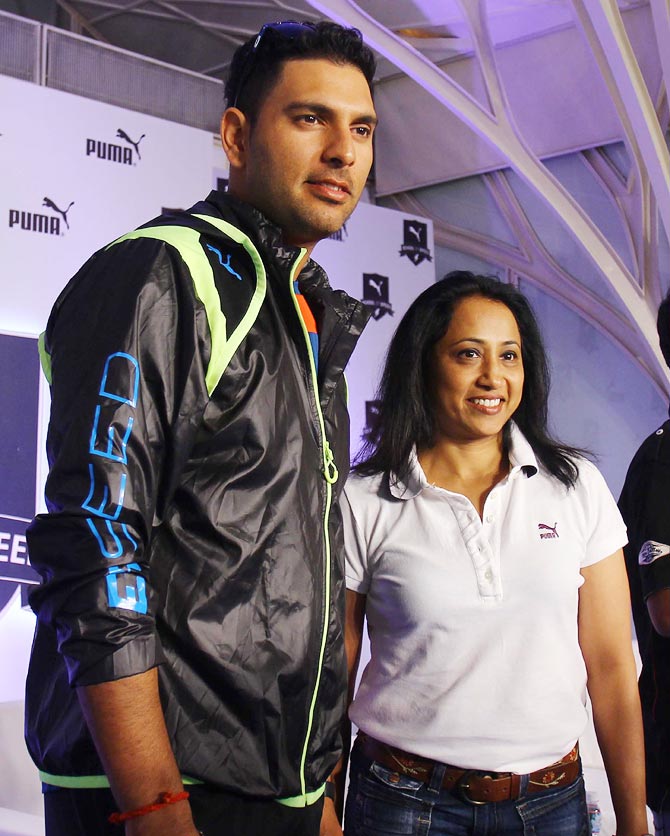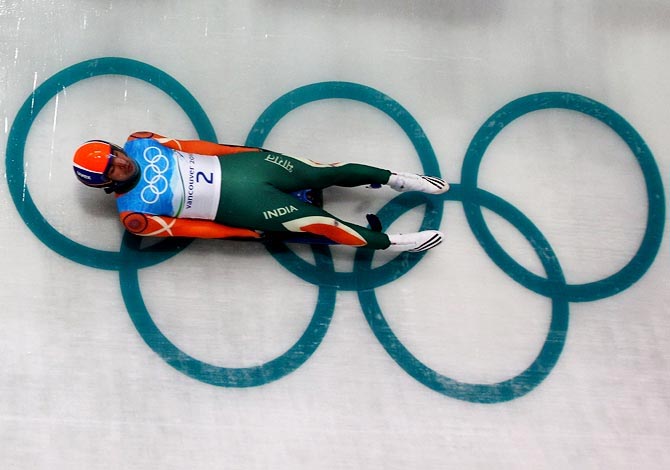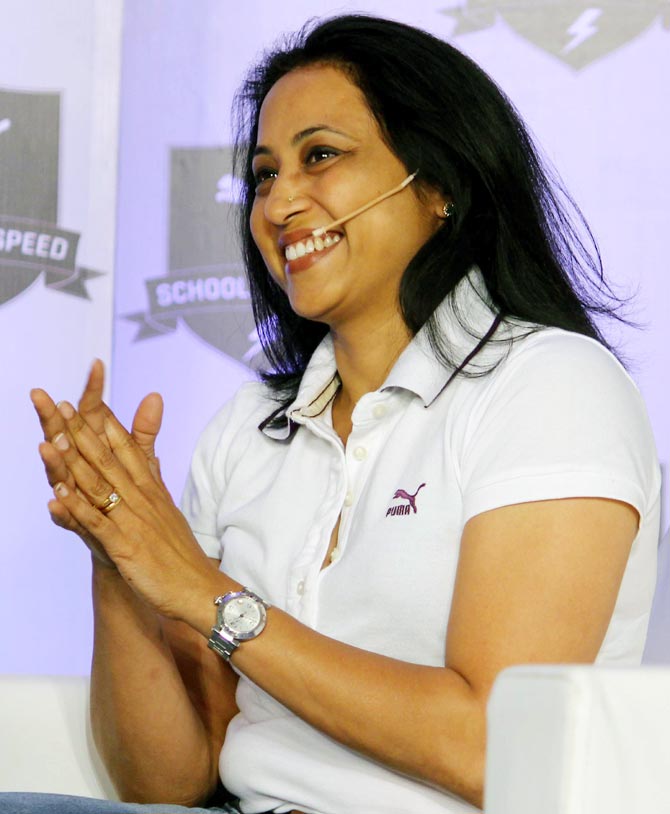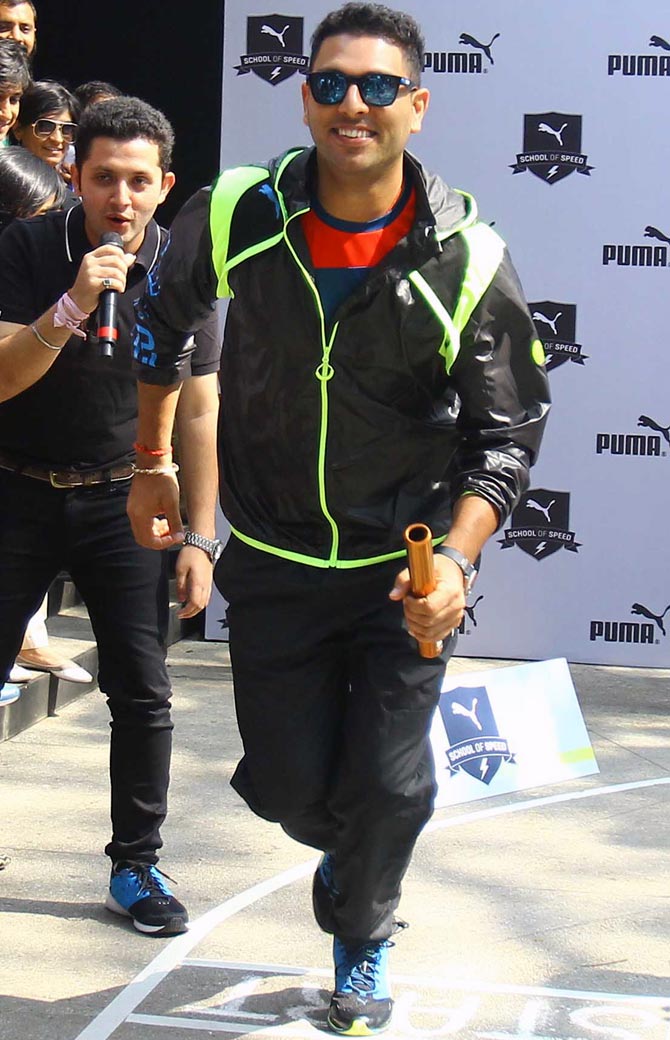Photographs: Hitesh Harisinghani/Rediff.com
‘We have kept ourselves out of the system for far too long and that is why they are running all over us.’
Former India sprinter Ashwini Nachappa is livid about the way the country's athletes are being treated by the Indian Olympic Association. Harish Kotian reports.
Former sprinter Ashwini Nachappa blasted the Indian Olympic Association on Wednesday for not advancing its elections, scheduled on February 9, because of which the country's athletes will compete as independent sportspersons at next month’s Winter Olympics in Sochi.
"The very fact that our Indian team is going to the Winter Olympics without sorting out these issues speaks volumes," said the ace sprinter of the 1980s and '90s, at the launch of 'PUMA School of Speed', in Mumbai, where discarded India cricketer Yuvraj Singh was also present to inspire children to take up running.
"I would have hoped that they had their general assembly and the elections, and adopted the constitution as per the guidelines of the IOC, prior to the team's departure, so that they could at least compete under our national flag.
"Unfortunately, the officials don’t consider that important at all. They have always been insensitive towards the athletes but to this extent! The Games are in February first week, so you could have well had the elections now. What is the big deal?" Nachappa added.
'We need to fight from within the system, get into the system'
Image: Shiva Keshavan in actionPhotographs: Richard Heathcote/Getty Images
Luger Shiva Keshavan, who will participate in his fifth Winter Olympics at Sochi from February 7 to 23, had also slammed the IOA for their lacklustre attitude towards the athletes.
'In the first place, it is a huge letdown to be denied the right to walk under our national flag by some people from our own country. It not only exposes the state of affairs of sport and the people who govern it, to everyone in India, but to everyone around the world. We athletes are the face of the country and we face the humiliation caused by people who have not taken their responsibilities seriously. You just need to do a simple Internet search to see that almost every country's national newspaper has run the news of India's ouster from the Olympics. I am deeply saddened,' he had told Rediff.com.
Nachappa, who is president of the Bangalore Districts Association and vice-president of the Karnataka Athletics Association, called on other former athletes to come forward and foray into sports administration.
"I would also personally believe that we need to fight from within the system. You have got to be part of it because there is no other way sportspersons like us will be allowed into the system. So you have got to get into that, and so I have taken this route. We have kept ourselves out of the system for far too long and that is why they are running all over us," she added.
'We would have never ever imagined IOA being suspended'
Image: Ashwini NachappaPhotographs: Hitesh Harisinghani/Rediff.com
Nachappa won five gold medals and four silver medals in three South Asian Federation Games in the 1980s, while also participating in the 1986 and 1990 Asian Games.
The 46-year-old was a member of the 4 x 400 metres relay team at the 1987 World Athletics Championships in Rome, and four years later in Tokyo, and also competed in the same event at the 1988 Olympic Games in Seoul.
The International Olympic Committee banned the IOA in December 2012 after Abhay Chautala and Lalit Bhanot, who were elected president and secretary-general, were set to take over despite being linked to allegations of corruption at the 2010 Commonwealth Games in New Delhi.
Nachappa believes that the IOC’s timely intervention, which forced the IOA to conduct fresh elections and also bar charge-framed contestants from contesting its elections, will be beneficial for Indian sport in the long run.
"I think this is the first step. We would have never ever imagined IOA being suspended, but today the entire nation, whether you are a sportsperson or not, talks about the rot in Indian sport across disciplines.
"I think there is a lot of media coverage on issues like these which has actually kind of brought some element of fear and shame to a few officials. I hope in the near future that the number of officials getting affected by that would be more," she added.
'Performance enhancing drugs have become very rampant even in our country'
Image: Yuvraj SinghPhotographs: Hitesh Harisinghani/Rediff.com
Nachappa fears that the evil of doping is spreading rampantly throughout the country and more and more youngsters are falling into that trap.
"I believe performance-enhancing drugs have become very rampant even in our country and has become a dangerous trend among young children. You go to any National Championships and you see syringes all over the ground and in the toilets. Even if you are just giving them saline they may think about that [doping].
"I am connected with athletics and when I see the junior meets that take place, it is actually quite frightening. I think that we need to have a broader education, not just within the classroom, but on the field. Along with the children, even our trainers have to be educated because the kids will not know what they are taking till a certain age, and will believe their coaches. So we have to be a little sensitive on issues like these," she said.
The former athlete is not in favour of India bidding for major events like the Olympics at least for the next 10-15 years unless the performance of the country's athletes improves at the international level.
"The kind of the mess we are in right now, we are not ready for it. It will be a colossal waste. If you can win say 30 medals, then go for it. We don’t have the infrastructure, and we don’t have a programme in place. I don’t think hosting the Olympics will resolve our issues; we need to sort our home first," said Nachappa.
The 'School of Speed' is a relay race for children between the age group of 13-16 years. Each team, comprising four members, runs one kilometre each, competing for the title of the fastest school, next month. The biggest incentive for the children is that the fastest runner will stand a chance to meet the world’s fastest man, Usain Bolt.





Comment
article